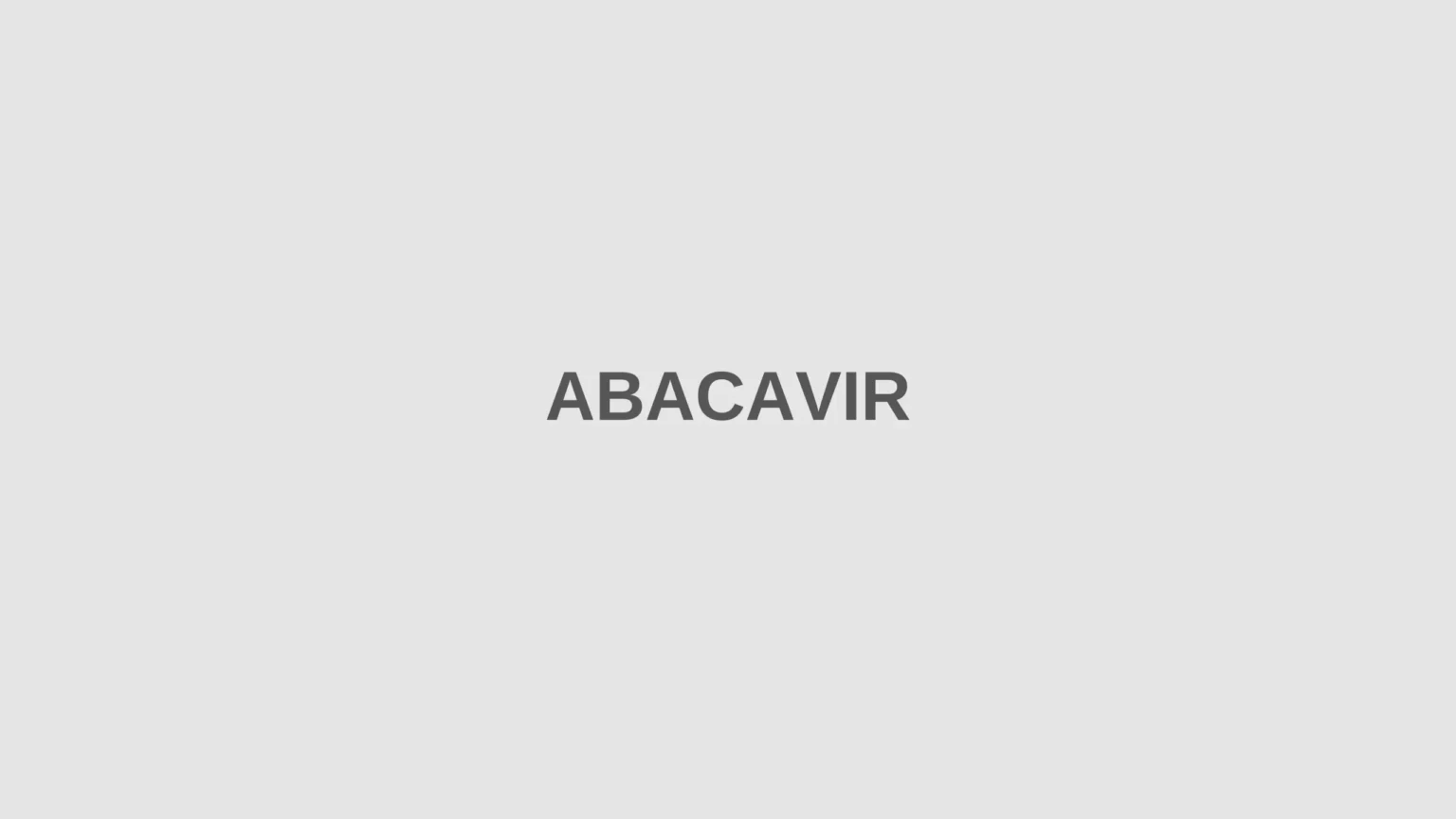Abacavir is an antiviral drug used in the treatment of HIV infection. This drug can slow down the development of symptoms and reduce the risk of complications due to HIV infection. The use of abacavir should be accompanied by other anti-HIV drugs to maximize its effectiveness.
Abacavir belongs to the group of antiretroviral drugs . Abacavir is able to inhibit the replication or reproduction of the HIV virus so that the amount of HIV virus in the blood will decrease.
By consuming abacavir, the immune system can work better. In addition, the risk of complications due to HIV, such as AIDS, severe infection, or certain types of cancer can also decrease.
It should be known that Abacavir cannot cure HIV/AIDS. This drug also cannot be used to prevent the transmission of HIV/AIDS.
Abacavir brand name: Abacavex, Abacavir Sulfate
| Group | Prescription drugs |
| Category | Antiviral nucleoside reverse transcriptase inhibitors (NRTIs) |
| Benefits | Slow down the progression of HIV infection |
| Consumed by | Adults and children aged ≥3 months |
| Abacavir for pregnant women | Category C: Studies on experimental animals show side effects on the fetus, but there are no controlled studies on pregnant women. This medicine can only be used if the magnitude of the expected benefit exceeds the magnitude of the risk to the fetus. |
| Abacavir for nursing mothers | Abacavir can be absorbed into breast. milk. Mothers infected with HIV are advised not to breastfeed to avoid the risk of transmission of the HIV virus to the baby through breast milk. |
| Drug form | Tablets |
Warnings Before Taking Abacavir
Abacavir should not be used casually and should be in accordance with the doctor’s prescription. Some things to consider before consuming this medicine are:
- Tell your doctor about any allergies you have. Abacavir should not be given to people who are allergic to this drug.
- Tell your doctor if you are suffering from severe liver disease, such as cirrhosis and liver failure , or have been diagnosed with the HLA-B*570 genetic variation.
- Abacavir should not be used by patients with these conditions.Tell your doctor if you are or have ever suffered from liver disease or kidney disease.
- Tell your doctor if you are or have suffered from heart and blood vessel disease, such as hypertension . Also inform the doctor if you have conditions that can increase the risk of the disease, such as high cholesterol , diabetes, or smoking habits .
- Tell your doctor about all supplements, herbal products, or certain drugs you are using, including if you have ever taken other HIV drugs.
- Tell your doctor if you are pregnant, plan to become pregnant, or are currently pregnant
- Tell your doctor that you are taking abacavir if you plan to undergo dental treatment or surgery.
- Immediately see a doctor if you experience a drug allergy , overdose, or serious side effect after consuming abacavir.
Dosage and Administration of Abacavir
The dose of abacavir will be determined by the doctor based on the patient’s age and condition, as well as the patient’s response to treatment. In children, the dose of abacavir is determined based on their body weight (BB). The dose can change if the child’s weight increases or decreases.
- Adults and children aged ≥3 months with a body weight ≥25 kg: The dose is 300 mg, 2 times a day, or 600 mg, 1 time a day. Treatment is combined with other HIV drugs.
- Children aged ≥3 months with a body weight of 14–19 kg: The dose is 150 mg, 2 times a day, or 300 mg, 1 time a day
- Children aged ≥3 months with a body weight of 20–24 kg: The dose is 150 mg, consumed in the morning, and 300 mg, consumed at night, or 450 mg, consumed 1 time a day.
How to Consume Abacavir Correctly
Follow
the doctor’s advice and read the information on the medicine package before consuming abacavir. Do not change the dose or stop taking the medicine without the doctor’s approval. This can cause the number of viruses in the body to increase and make the disease more difficult to deal with.
Here is how to take abacavir correctly:
- Consume abacavir before or after Swallow abacavir tablets whole with a glass of water. If it is difficult to swallow the tablet, rub the medicine, then mix it with water and drink it immediately.
- Drink abacavir regularly at the same time every day for the effect of the treatment. If you forget, take this medicine immediately so you remember. However, if the next consumption schedule is close, ignore it and do not double the dose.
- Do routine health check-ups with the doctor during therapy with abacavir so that the development of your condition can be monitored. Follow the treatment schedule prescribed by the doctor.
- Store abacavir tablets in a closed container in a cool room. Do not store this medicine in a hot or humid place. Keep the medicine out of the reach of children.
Abacavir Interactions with Other Drugs
The use of abacavir with other drugs can cause drug interaction effects. Possible effects include:
- Increased risk of liver damage if used with ribavirin
- Decreased effectiveness of abacavir if used with phenytoin , rifampicin, or phenobarbital
- A decrease in methadone levels in the blood
In addition, the consumption of abacavir with alcoholic beverages can cause an interaction effect in the form of an increase in the level of abacavir in the blood which can cause serious side effects.
Side Effects and Dangers of Abacavir
Some side effects that may appear after taking abacavir are:
- Headache
- Nausea, vomiting, diarrhea
- No appetite
- Restless
- Strange dreams, difficulty sleeping or insomnia
- Stuffy nose or sneezing
Check yourself with a doctor if the side effects above do not subside or even worsen. Immediately seek medical help in the event of a drug allergic reaction or the following serious side effects:
- Symptoms of a new infection, such as fever , chills, night sweats, swollen lymph nodes, cough , shortness of breath, weight loss, or wounds that do not heal
- Hyperthyroidism, which can be marked by goiter, protruding eyeballs, palpitations, hot flashes and sweating, menstrual cycle disorders, or impotence
- Symptoms of liver dysfunction include dark urine, pale stools like clay, or jaundice
- Unusually unwell or tired; persistent muscle pain; visual impairment; or numbness and tingling in the arms, hands, and legs
- Difficulty walking due to balance disorders; or difficulty chewing, swallowing, or speaking
- Mood disorders, such as depression
- Chest pain that spreads to the shoulder and jaw area
- Lactic acidosis , whose symptoms include short and rapid breathing, fainting, vomiting, cramps or muscle pain
SOURCE :
Jesson, J., et al. (20220. Safety and efficacy of abacavir for treating infants, children, and adolescents living with HIV: a systematic review and meta-analysis. Lancet Child Adolesc Health, 6(10), pp. 692–704.
Eriksen, J., et al. ( 2020). Antiretroviral Treatment for HIV. 2019.
The Food and Drug Administration (2023).
).Drug Database.Abacavir. (
2023 ).Abacavir
( 2023 ). (2022). Abacavir ( 2023). Abacavir (2023).

